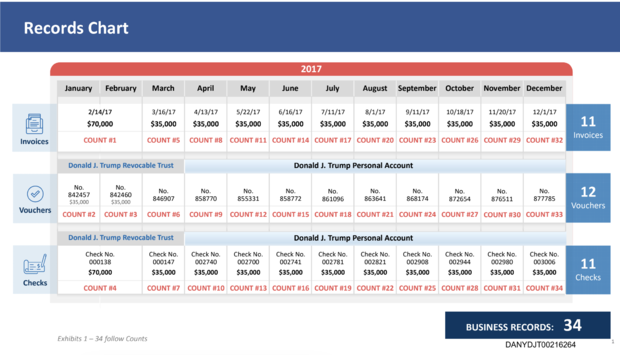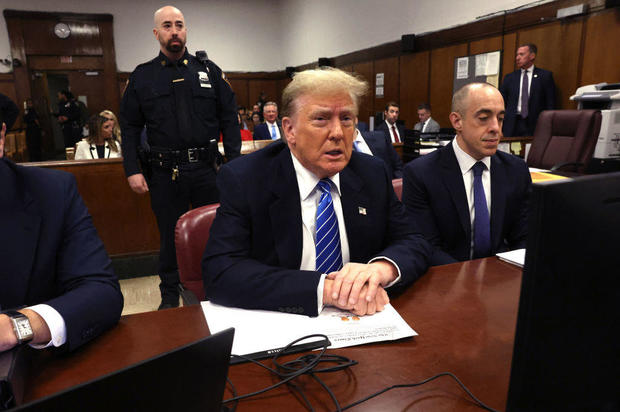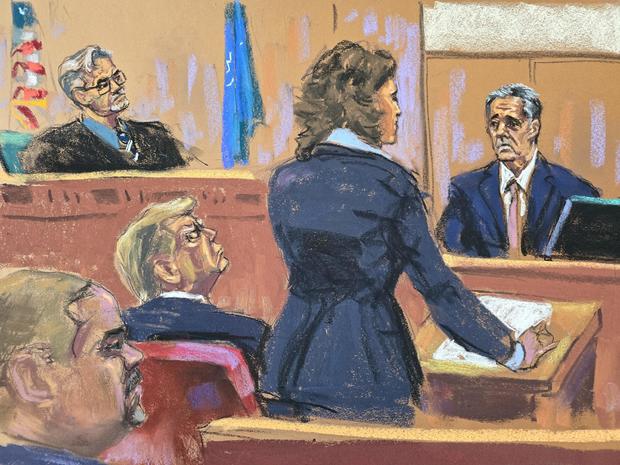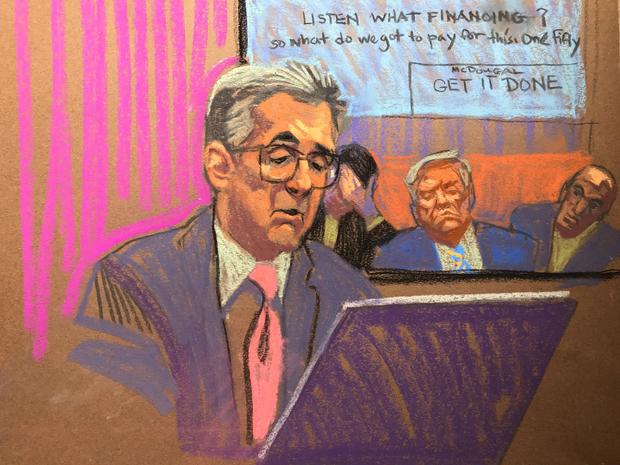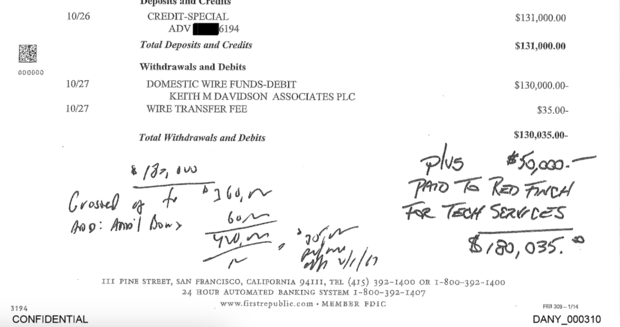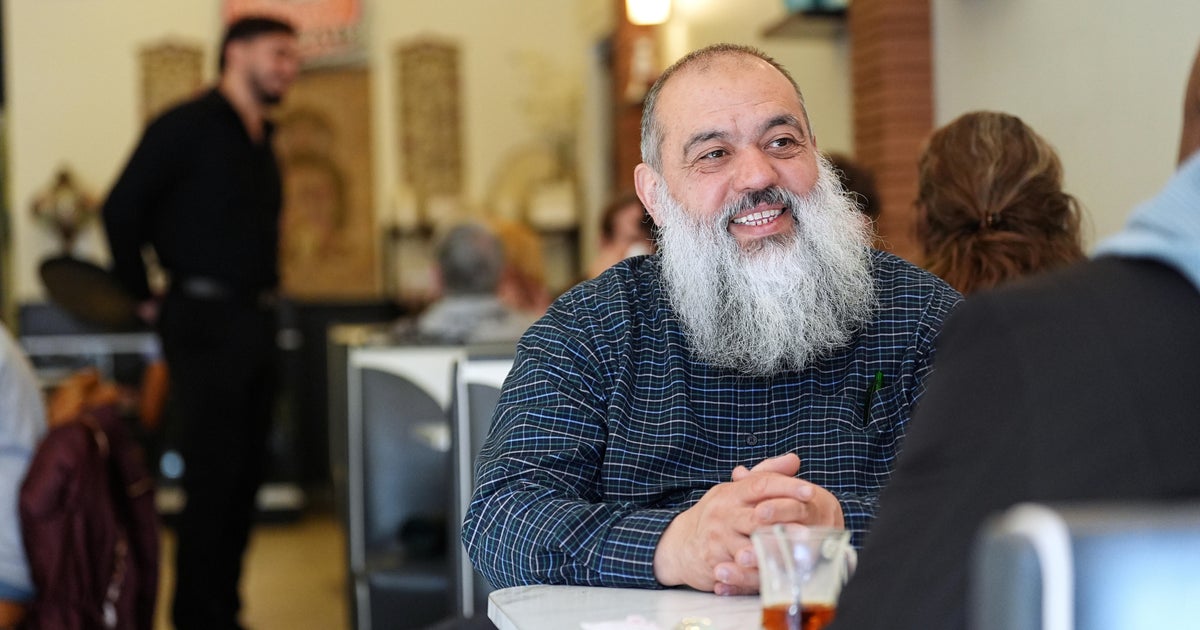Michael Cohen, key witness against Trump, testifies at trial about "hush money" payments
Donald Trump received regular updates on efforts to cover up salacious stories about him when he ran for president in 2016 and personally signed off on a scheme to falsify records related to them, his former lawyer Michael Cohen told jurors at Trump's criminal trial on Monday.
Cohen was among Trump's most trusted legal advisers before he became president and is now an ardent critic of his former boss. On the stand, Cohen told jurors that Trump had intimate knowledge of "hush money" payments made before the 2016 election to two women who claimed they had sex with him.
The presumptive GOP presidential nominee faces 34 felony counts of falsifying business records and has pleaded not guilty. He denies having sex with the women.
Cohen is a key character in the prosecution's narrative, having made one of the "hush money" payments himself. In October 2016, he paid adult film star Stormy Daniels $130,000 out of his own pocket in exchange for her silence. Cohen said he agreed to put up the money to protect Trump, who wanted him to delay the agreement with Daniels and "just get past the election."
"Because if I win it won't have relevance, I'm going to be the president. And if I lose, I won't really care," Trump said, according to Cohen.
Prosecutors say 11 checks that Cohen received from Trump over the course of the following year were falsely classified as legal fees to cover up the deal with Daniels. Cohen testified that Trump approved of the plan to reimburse him.
Defense attorneys are expected to fiercely attack Cohen's credibility when they get the chance to pose questions. In 2018, he pleaded guilty to federal charges related to the Daniels payment, as well as lying to Congress. When he testified in a separate Trump civil case last year, Cohen also admitted to lying under oath in other instances.
Cohen will return to the stand on Tuesday as prosecutors continue their questioning. Here's how his first day of testimony unfolded:
What the Trump trial is all about
On Friday, for the first time, jurors saw in simple graphic form what this case really boils down to: 34 felony counts of falsification of business records. Each count correlates with a check, invoice or voucher depicting a 2017 monthly payment to Cohen as being for ongoing legal services.
Prosecutors say each document covered up its true purpose, a monthly reimbursement installment for Cohen's "hush money" payment to Daniels — designed to prevent voters from ever finding out.
See the graphic shown to jurors here:
A full house in court for a key witness
The front two rows on the defense side of the gallery are reserved for Trump's entourage. Sometimes they're close to empty, with a few seats taken by Secret Service and aides such as Boris Epshteyn.
Those rows are full today as the case's key witness — and a Trump nemesis — is called to the stand.
Trump walked into the room frowning, followed by his son Eric, Ohio Sen. J.D. Vance, New York Rep. Nicole Malliotakis, Alabama Sen. Tommy Tuberville and Iowa Attorney General Brenna Bird, among others.
On the other side of the aisle, those two rows are also nearly full. They include Manhattan District Attorney Alvin Bragg. He has not attended much of this trial, perhaps parts of five days, mostly making a point to be in the room when his own staff was called to the stand.
Cohen called to the stand as first witness of the day
As expected, the first witness as this trial enters its fifth week is Cohen. Formerly Trump's right hand man, he's now the witness who could tie Trump to felonies and potentially play a crucial role in making the case against his former boss.
He entered the courtroom wearing a navy blue suit and pink tie. Prosecutor Susan Hoffinger is leading the questioning for the district attorney's office.
Cohen lays out career background and how he met Trump
Questioning began with Cohen, 57, describing his upbringing and earlier career. He said he's been married for 30 years and has two adult children.
"I didn't want to be a lawyer. My grandmother wanted me to be a lawyer," he said, laughing. "I wanted to go to Wall Street. My grandmother was like, that's not going to happen."
He said he began investing in taxi medallions in New York and several new developments, including Trump properties. He said he was introduced to Trump by his son, Donald Trump Jr., after resolving a situation with the board at Trump World Tower.
Hoffinger asked him to identify Trump by saying an article of clothing he's wearing. Cohen tried to crane his neck around the judge's bench, but couldn't see him. He stood up to look at him.
"He's wearing a blue and white tie," Cohen said.
Around 2007, while working at a law firm, he said he was asked to review a set of documents related to Trump Entertainment Resorts.
"I reviewed it, it was quite lengthy. There were some issues going on there with regards to a Chapter 11 reorganization plan. We ended up resolving it and the bill was approximately $100,000," he remembered.
He said he then met with Trump, who offered him a job.
"I asked about the bill. He asked if I was happy at my 'sleepy old firm.' I stated I was. He said, 'Would you want to come work with me?'" Cohen testified. "I was honored. I was taken by surprise. And I agreed."
The bill wasn't paid, Cohen said.
"He asked if I wanted to get fired on the first day, if I asked about the bill," he said.
Once Trump made the offer, Cohen said he never went back to his old firm, even to retrieve his belongings. At the Trump Organization, his title was executive vice president and special counsel to Donald J. Trump. He said he was making more than half a million dollars in this position.
Cohen describes renegotiating bills for Trump, handling personal matters
Cohen said he was never part of the general counsel's office at the Trump Organization and reported directly to Trump. As part of his work, he said he sometimes renegotiated bills.
"For example, a law firm would send an invoice. [Trump] didn't believe that the invoice was fair, reasonable, justified. And so he would give me the task of renegotiating a specific bill," Cohen remembered.
Another example involved Trump University, the now-defunct for-profit education company. Cohen recalled a point when the company's bills exceeded the $2 million it had in the bank, and it owed money to approximately 50 vendors.
"Trump was not going to fund the balance, so what I did was put them into a handwritten spreadsheet, and divided the $2 million, and came to approximately 20% of the invoice," he remembered. All but two vendors accepted the 20%, he said, noting that the other two "just went away" without being paid.
He also said he handled personal matters for Trump, including meeting with a driver when Trump's limousine was hit by a yellow cab. He handled insurance adjustments when Trump's apartment bathroom flooded.
Cohen said he spoke to Trump every day, and often multiple times per day, leading up to Trump running for president.
Cohen says working for Trump was "an amazing experience"
Cohen reflected on his time working for Trump, saying it was "an amazing experience in many, many ways." Cohen said he enjoyed working with his colleagues at the Trump Organization, as well as with the Trump children. "It was a big family," he testified. Cohen said he felt "fantastic" and enjoyed the responsibilities he was tasked with.
During his tenure working for Trump, Cohen said that he lied and bullied people for the former president because it was needed to accomplish his tasks.
"The only thing that was on my mind was to accomplish the task to make him happy," he said.
What's in a nickname?
Hoffinger asked Cohen if he had a particular way of referring to Trump.
"Yes, I would call him 'Boss,'" Cohen said. It was a subtle but important detail: the jury has heard multiple references to Cohen and others calling Trump by that moniker.
Later, Hoffinger asked if it was fair to say Cohen was known as Trump's "fixer."
"It's fair," Cohen said.
The jurors have also heard repeatedly about how, at the very least, Cohen portrayed himself as filling that role for Trump.
Earlier in the trial, former Trump aide Hope Hicks recalled that the nickname was a source of frustration.
"I used to say that he liked to call himself a fixer, or Mr. Fix-It. But it was only because he first broke it that he was able to fix it," Hicks said.
Cohen says Trump declined to run in 2011 due to real estate projects, another season of "The Apprentice"
Cohen said he initially floated the idea of Trump running for president in 2011 after reading an article that cited a poll saying 6% of people thought Trump should seek the nation's highest office.
"It's interesting, we should look into it," Cohen recalled Trump saying.
Cohen said he created the website ShouldTrumpRun.com and attracted a lot of traffic. He said that served as proof that the real estate mogul held a lot of name recognition and popularity.
He said that Trump ultimately decided not to run in 2011 due to large real estate projects and another upcoming season of NBC's "The Apprentice."
"As Mr. Trump told me, you don't leave Hollywood, Hollywood leaves you," Cohen said, adding that Trump promised to run in the next election cycle and in the years that followed they would talk about announcing a run in 2015.
Cohen describes 2015 meeting with David Pecker, origins of "catch and kill" scheme
Once Trump's presidential campaign got underway in 2015, Cohen met with Trump and David Pecker, the publisher of the National Enquirer, at Trump Tower in New York.
Pecker testified earlier in the trial that it was in this meeting that he vowed to be Trump's "eyes and ears" and look out for negative stories before they were published. Prosecutors have portrayed the meeting as the beginning of a "catch and kill" scheme to buy up the rights to damaging stories about Trump so they never saw the light of day.
Cohen testified about what he remembered about the sit-down, saying the three discussed "the power of the National Enquirer, in terms of being located at the cash register of so many supermarkets and bodegas."
"If we could place positive stories about Mr. Trump, that would be beneficial. If we could place negative stories about some of the other candidates, that could also be beneficial," he said.
In the months following the meeting, the National Enquirer published salacious stories targeting Trump's rivals for the presidency. Cohen said Pecker or Dylan Howard, the tabloid's editor, would preview the stories for him.
"Some of the negative ones that I would receive from David or from Dylan Howard was Hillary Clinton wearing very thick glasses and some allegations that she had some brain injury," Cohen testified.
Another linked Sen. Ted Cruz's father to the assassination of President John F. Kennedy. As Cohen described the article on the stand, Ohio GOP Sen. J.D. Vance looked toward Sen. Tommy Tuberville, and they both laughed.
Cohen recalls first use of "catch and kill" to suppress story
In the fall of 2015, Cohen said he heard that a former doorman at Trump Tower was trying to sell a negative story about Trump. The man, who was quickly shown to be lying, claimed that Trump fathered an illegitimate child with a maid at Trump Tower.
Cohen said he told Trump about the story and sought his guidance about what to do.
"He told me to make sure that this story doesn't get out. 'You handle it,'" Cohen testified.
Cohen said he worked with Pecker and Howard to obtain the rights to the story. The price was $30,000, paid by American Media Inc., the Enquirer's parent company. It was the first time the publication had ever decided to purchase a story about Trump, Pecker testified earlier.
Trump's former attorney said he kept Trump updated as the terms of the deal were worked out. The purpose was to "take it off the market" and prevent another outlet from publishing the story, Cohen said, echoing a phrase Pecker also used under oath.
Cohen said he reviewed the contract with the doorman "to make sure Mr. Trump was fully protected, and so I could show the contract to Mr. Trump." He said Trump told him, "That's great."
Cohen says he kept Trump updated about talks over Karen McDougal payment
In the summer of 2016, Karen McDougal, a former Playboy model, was trying to sell her story about an alleged sexual encounter she had with Trump, which he denies. Her attorney Keith Davidson approached the National Enquirer about a deal that June.
Cohen said Pecker and Howard flagged the story to him. He said he thought it would have had a "significant" impact on Trump's campaign and that he told Trump about it "immediately."
"I told him about what I had just learned. I asked him if he knew who Karen McDougal was, if he knew about the story. His response to me was, 'She's really beautiful,'" Cohen remembered Trump saying. "OK, but right now there's a story that's being shopped."
"Make sure that it doesn't get released," Cohen said Trump told him.
Cohen said Pecker and Howard kept him updated on the negotiations with McDougal, and Cohen in turn told Trump about developments "frequently."
Prosecutors showed a series of texts between Cohen and Keith Schiller, Trump's bodyguard, in June 2016. Cohen was asking Schiller if Trump was available to speak. Call logs showed a phone call with Schiller right after the texts. Cohen testified that the call was about "the updates that I received about the Karen McDougal matter."
Pecker called Trump while Cohen was in the room soon after, Cohen testified, and Trump put the call on speakerphone.
"He asked him how things were going with the matter, and David said we have this under control and we will, we'll take care of this," Cohen said. "So David had stated that it's going to cost them $150,000 to control the story, to which Mr. Trump replied, 'No problem, I'll take care of it.'"
The deal was finalized in August. Cohen said he believed that "effectively the story has now been caught." He described Trump's reaction: "Fantastic. Great job."
Trump never paid back the $150,000 AMI put forward to secure the rights to McDougal's story, Pecker testified.
Cohen says Pecker told him AMI had a locked drawer with files on Trump
Cohen said he had lunch with Pecker in the fall of 2016, and he was angry about not being paid back for the McDougal deal. Cohen said he raised the issue with Trump on "several occasions" and Trump assured him he would pay.
At one point, Cohen said he spoke with Trump about files AMI had about him.
"David had expressed to me that, obviously the relationship with Trump goes back many, many years, and obviously there's a locked drawer, or a file drawer, where files that relate to Mr. Trump get stored," Cohen said.
He recalled that Pecker was under consideration for a new position at Time, Inc. Cohen said he expressed to Trump that if Pecker left, then those papers would be left at AMI. He thought they may be "open for use" since they didn't know who would replace Pecker.
Cohen said he discussed those concerns with Pecker, who said the files could be purchased and they would figure out a way for Cohen to "take control" of them.
Earlier in the trial, Pecker testified that Cohen contacted him in 2016 and said Trump wanted to acquire the rights to McDougal's account. When Pecker asked why, Cohen told him "the boss" wanted to control the story in case Pecker got "hit by a bus" or "the company got sold," according to Pecker.
Cohen ultimately reached an agreement with AMI to secure the rights to McDougal's story for $125,000, but the deal was never finalized.
Cohen tells jury why he recorded conversation with Trump
Cohen answered questions about a recording he made of a conversation with Trump in September 2016, in which the two can be heard seemingly discussing buying the rights to McDougal's story from AMI. Cohen said it was the only time he had ever recorded his boss.
He said he taped the conversation so he could play it back for Pecker, who was pressuring him to get Trump to repay him most of the $150,000. Cohen said Trump didn't know he was being recorded.
"I had my cellphone in my hand and I put it on voice memo — all Apple iPhones have it — and I hit record and I walked into Mr. Trump's office," Cohen testified, saying he sat across from him at his desk.
Prosecutors played the recording for the jury, who had already heard it earlier in the trial. Cohen can be heard saying, "I need to open up a company for the transfer of all of that info regarding our friend, David," an apparent reference to buying the rights to McDougal's story.
"So, what do we got to pay for this? 150?" Trump can be heard saying.
On the stand, Cohen said he needed to open an LLC to handle the payment "in order to have separation, to keep it away from Mr. Trump." He also said Trump suggested paying in cash, but "that's not what I thought would be a good way to do it."
The recording first came to light in July 2018, just weeks before Cohen pleaded guilty to federal charges stemming from the payments to Daniels and McDougal.
Cohen recalls talks over purchasing McDougal rights from AMI
Cohen detailed his conversations as he worked to obtain the non-disclosure portion of McDougal's agreement with AMI in September 2016. He reached a deal to pay the company $125,000, less than the $150,000 AMI paid McDougal. He said the difference was meant to account for work McDougal had done under the contract.
Pecker testified that he was under increasing pressure to recoup the payment before the end of the fiscal quarter.
Cohen formed an entity called Resolution Consultants LLC to handle the payment. A former AMI executive set up an LLC of his own to receive the money on Pecker's behalf. The jury was shown chats and emails between Cohen and the executive discussing the nuts and bolts of the agreement.
Cohen testified that he understood that Trump was ultimately going to pay for the rights.
"I had no reason to own, no need to own, the life rights," he said. "What I was doing was for the benefit of Mr. Trump."
At the end of September, Pecker called Cohen and told him that he would no longer need to pay the $125,000. "The reason was that the Karen McDougal front cover of Men's Health magazine had sold more covers than" they had ever sold, Cohen recalled on the stand.
"He told me to rip it up, forget it," Cohen said, adding that Pecker told him that the material about Trump kept in a locked drawer at AMI wasn't "detrimental."
Cohen and Trump spoke on the phone amid "Access Hollywood" fallout
On Oct. 7, 2016, a now-infamous recording emerged of Trump behind the scenes of the celebrity news show "Access Hollywood." On the tape, Trump is heard saying he could "grab [women] by the p****" and "make them do anything." The recording shook the campaign.
The jury was shown an email that Cohen wrote to Trump campaign chief Steve Bannon complaining about the campaign's reaction: "It's all over the place. Whose (sic) doing damage control here?"
He then described a pair of phone calls he had with Trump the next day, interrupting a dinner Cohen was having in London with his family. The jury was also shown a call log, reflecting that two calls occurred.
"He wanted me to reach out to all of my contacts in the media. We needed to put a spin on this," Cohen said.
Cohen said he believed the future first lady came up with the thrust of the campaign's response.
"And the spin that he wanted to put on it was, this was 'locker room talk,' something Melania had recommended, or at least that's what Melania thought it was," Cohen said.
Soon after, Cohen learned that Daniels was shopping her story. He recalled thinking that Daniels coming forward would be "catastrophic" and "horrible for the campaign."
"Just get past the election": Cohen says Trump worried about political impact of Daniels coming forward
On Oct. 9, 2016, Dylan Howard, the editor of the National Enquirer, told Cohen that Keith Davidson, who was representing Daniels, was willing to make a deal for her silence. The Enquirer was not interested in getting involved. Cohen and Davidson spoke on the phone twice the next day, according to call logs shown to the jury.
Cohen said he frequently updated Trump about the ensuing negotiations.
"He was really angry with me. 'I thought you had this under control. I thought you took care of this,'" Cohen remembered. "He said to me, 'This is a disaster, a total disaster. Women are going to hate me.'"
Cohen said Trump was worried about his standing in the polls among women, especially after the release of the "Access Hollywood" tape. He said Trump "told me to talk to David [Pecker] and get the rights" to Daniels' story.
Trump wanted Cohen to stall the talks so the story wouldn't come out before Election Day.
"He had said to me, 'What I want you to do is push it out as long as you can, just get past the election,'" Cohen testified. "'Because if I win it won't have relevance, I'm going to be the president. And if I lose, I won't really care.'"
He said Trump was not worried about how his wife Melania would react to the Daniels story coming to light. "He wasn't thinking about Melania. It was all about the campaign," Cohen testified.
Cohen details efforts to delay finalizing Stormy Daniels agreement
Davidson, Daniels' attorney, set a deadline of Oct. 14 to execute the agreement. Cohen said he delayed finalizing the deal, like Trump had instructed him.
"In this particular case I used the holiday, Yom Kippur, in order to delay," he said.
In the meantime, Cohen worked to set up a bank account for the entity he created to handle the McDougal transaction, Resolution Consultants LLC. He emailed his banker on Oct. 13 asking to open a new account, and said on the stand that he lied about what kind of company it was.
"I'm not sure they would have opened it if it had stated 'to pay off an adult film star for a non-disclosure agreement,'" Cohen testified.
On Oct. 17, Davidson sent Cohen an email saying the deal was off. He said he was no longer representing Daniels and she was taking her story to another outlet.
"We were losing control over the settlement of this agreement to prevent the story from coming out as a result of my failure to wire funds," Cohen said.
Later that day, Cohen opened a new LLC to handle the transaction: Essential Consultants. He said he realized a friend already had a company called Resolution Consultants.
Cohen recalls why he made the $130,000 payment from his own pocket
Cohen said he learned that Daniels was planning to take her story to the Daily Mail, a British tabloid. He said there came a time when Trump realized he had no choice but to make the deal.
"[Trump] stated to me that he had spoken to some friends, some individuals, very smart people, and that, 'It's $130,000 and you're a billionaire, just pay it. There's no reason to keep this thing out here, just do it,'" Cohen testified. "So he expressed to me, 'Just do it. Go meet up with Allen Weisselberg and figure this whole thing out.'"
Weisselberg was the longtime chief financial officer of the Trump Organization. Cohen said the payment needed to be made "immediately" and suggested that Weisselberg make the payment himself.
"I suggested to Allen, 'You're a CFO, you make seven figures, why don't you just go do it?'" Cohen recalled. Weisselberg declined, saying he had four grandchildren in prep school and summer camp and couldn't come up with the money, according to Cohen.
"Because of the urgency, and because they were heading to the Daily Mail, I ultimately said, 'OK, I'll pay for it,'" Cohen said, adding that Weisselberg assured him Trump would pay him back. He said the three spoke and Cohen told him he would front the money.
"He stated to me, 'Don't worry, you'll get the money back,'" Cohen testified.
Asked if he would ever have made the payment without the expectation that he would be reimbursed, Cohen said: "No, ma'am. Well, it's $130,000. I was doing everything I could and more to protect my boss, which I had done for a long time, but I could not lay out $130,000 for an NDA needed by somebody else."
He opened a home equity line of credit, knowing that his wife would ask questions about such a large transaction if he used money from their bank account. "Once I received the money from Mr. Trump I would deposit it and nobody would be the wiser," he said.
Trump rests his eyes during much of Cohen's testimony
As the key witness in his historical criminal trial has testified throughout the day, Trump has been sitting at the defense table with his eyes seemingly closed for long stretches.
Often leaning back, his shoulders slumped to be almost parallel with the top of his seat and his arms at his side, Trump has appeared to not be watching.
In these moments, his mouth rests in a frown. Occasionally, his chin droops toward his chest.
He perks up at certain moments, like when his wife's name has been mentioned. Each time he could be seen whispering with one of his lawyers.
Cohen said he told Trump "immediately" after sending $130,000 payment
On Oct. 25, Cohen spoke with Davidson and told him he was finally ready to close the deal. Cohen recalled that Davidson, who previously tried to wipe his hands of the matter, was skeptical. Cohen told him that "soon he would have the funds."
Late that night, Cohen called Weisselberg to, as Cohen put it, "discuss the funding particulars regarding the funding of the non-disclosure."
He also called Trump the next day, Oct. 26: "I wanted to ensure that once again he approved what I was doing, because I required approval on all this." Asked if he would have made the payment without Trump's approval, Cohen replied: "No, because everything required Mr. Trump's sign-off. On top of that, I wanted the money back."
Cohen received an email confirming that the $131,000 he secured through his home equity line of credit — $130,000 for Daniels, plus $1,000 for wiring fees — had been deposited in the newly formed bank account for Essential Consultants. He forwarded the email to Davidson "to demonstrate to him that the deal is going to be consummated, that we're moving forward with it … that Ms. Daniels is under control."
Cohen wired $130,000 to Davidson the next day. On the form approving the transfer, he wrote that its purpose was "retainer."
He said he let Trump know "immediately" that he sent the money.
"For two reasons, so that he would know that the task given to me was accomplished and done, and also, to take credit for myself," Cohen testified. "Because this was important."
The agreement used the pseudonyms "Peggy Peterson" and "David Dennison" for Daniels and Trump.
Trump never signed the paperwork "to ensure that his name didn't appear anywhere, because he was a candidate for president of the United States of America," Cohen said on the stand. Instead, Cohen signed for Essential Consultants LLC: "Since it was an LLC, hopefully what I could do down the road is just transfer the LLC to Mr. Trump. He'd still be the beneficial owner of it."
"A real serious problem": Cohen describes conversation with Trump after McDougal story emerged
On Nov. 4, 2016, the Wall Street Journal published an article revealing that the National Enquirer "shielded Donald Trump from" McDougal's story.
Several witnesses have testified about the Trump campaign's internal reaction to that story. On the stand Monday, Cohen said he spoke with Trump about it during a phone call that night.
Cohen said he called Trump, through Trump's then bodyguard Keith Schiller, because "this was a real serious, again, problem, especially being that it was so close to Election Day."
Hoffinger asked if Trump was angry.
"Yes," Cohen replied. "Because there was a negative story that could impact the campaign."
Cohen says he was disappointed he wasn't considered for Trump's White House chief of staff
Cohen admitted on the stand that he was disappointed that he wasn't in the mix to become Trump's chief of staff when he entered the White House in January 2017. He added that he did not feel like he was qualified for the role nor did he want it, but he wanted to at least be considered.
"It was more about my ego," Cohen said.
The prosecution also entered into evidence text messages between Cohen and his daughter in which they talked about the chief of staff role. Cohen said his daughter suspected he may be upset, but he explained to her that there could be other opportunities, like personal attorney to the president — a role that Cohen eventually took up ahead of the inauguration.
Reince Priebus, the chairman of the Republican National Committee, won the job as Trump's first chief of staff, a role he would hold for just six months.
Cohen says he was furious when his 2016 bonus was cut
Cohen said he had to do a double-take when he opened his bonus at the end of 2016 and found it had been cut by two-thirds. He said he was "beyond angry" and "truly insulted, personally hurt."
He said he did not understand why the amount was lower than it had been the year before, given all that he had done for Trump, including by putting up the $130,000 for the Daniels deal.
"It was insulting that the gratitude that was shown back to me was to cut my bonus by two-thirds," Cohen said.
He said he marched into Weisselberg's office to express "how truly pissed off and angry I was."
"I used a few expletives," Cohen testified. He said he mentioned how he had put up the money, not Weisselberg. "That's what you get for extending yourself as I did?"
"I was, even for myself, unusually angry," Cohen recalled. He said Weisselberg reassured him, telling him to enjoy his vacation and that "Mr. Trump loves you."
Cohen said Trump called him before the new year while Cohen was away with his family. Trump said he had spoken to Weisselberg and knew how angry he was, Cohen said. "Don't worry about that other thing, I'm going to take care of you when you get back," Trump said, according to Cohen.
Cohen says Trump signed off on plan to reimburse him for Daniels payment
Previously during the trial, the jury was shown a copy of a bank statement for Essential Consultants, the company Cohen used to pay Daniels. It had Weisselberg's handwritten notes calculating the $420,000 that Cohen would receive in monthly installments over the next year. Those are the payments at the heart of this case.
The total included the $130,000 for the Daniels payment; $50,000 that Trump owed a tech company; and another $60,000 to make up for Cohen's smaller-than-expected bonus. The first $180,000 was doubled to account for taxes.
Cohen said that Weisselberg showed the notes to Trump during a meeting in Trump Tower in mid-January 2017. Cohen said Trump approved the plan to pay Cohen in installments designed to look like pay for legal services.
"This is going to be one heck of a ride in D.C.," Trump said in the meeting, according to Cohen.
